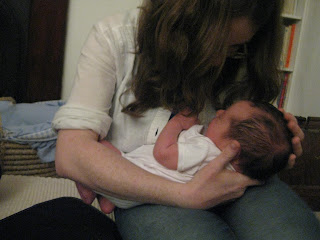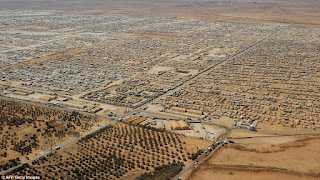Amman to Damascus
When we got back, it was hard to believe we’d
been so close, that that place still buzzed and blew and yet, we hadn’t approached
it. That it had existed at the other end of a taxi ride, caught there on the
tearing hill upon which we had lived, (“anywhere”) and I sang the tricycle
song as we waited with our bags lain around us. It was hard to believe that
the place, moulded out of the rock, encircled by small tweeting migratory
birds, home as soon as you breathed its air, was actually the next city along
in the modern version of an ancient chain. Next up from the metropolis gutted by
the trauma of exile and pasted over again with an appearance of modernity, in
which we’d spent however many weeks and months. Where we’d sat in restaurants
dedicated to a 65 year old dream of Jerusalem, still hung to as the last sense
of home or place the owners had felt.
We sailed in- and almost buckled when I
realised my image of the city had been re-collaged by the media, and I had doubted
that all knowing synchronicity it possessed. Doubting its very existence,
as if it were no longer a place, taken away and splattered on the front of all
the tabloids, where the spellings and positioning of words in a sentence was still haphazard
and it didn’t cost much to get things wrong.
The taxi driver complained, and spoke to his wife, and all glances saw the soldier, bracing his machine gun like a lego figure, pointing it down from the top of the bridge. And the men returning from work in Amman for Eid in their villages, as we were with our burnt bread biscuits (and a stealthy bottle of tequila) in the boot, spoke about the safety of their village, and he tried to bring the conversation onto a more middle class level, and debated the cost of watermelon. And spoke above the toll the blood was having on the cost of its flesh without mentioning the blood or the flesh.
The taxi driver complained, and spoke to his wife, and all glances saw the soldier, bracing his machine gun like a lego figure, pointing it down from the top of the bridge. And the men returning from work in Amman for Eid in their villages, as we were with our burnt bread biscuits (and a stealthy bottle of tequila) in the boot, spoke about the safety of their village, and he tried to bring the conversation onto a more middle class level, and debated the cost of watermelon. And spoke above the toll the blood was having on the cost of its flesh without mentioning the blood or the flesh.
As we inched in over Malki, I saw boy I had taught, staring into the air behind the boot of his parent’s
land rover (he isn’t there anymore, surely?). The one who asked me the previous
year, as we sat on the fish bowl bus, Why do you live in Syria, when you
could live in England? With a breadth of meaning I hadn’t heard when adults
chimed in with the same question, and I told him something about food, and
smiles on the street, and the light air carrying missals from the depths of the
desert at dusk, and thought it sounded stupid.
And then we were there, and I complained he
hadn’t got or listened to me, why were we there, where people (or we) were
bound to our homes, to whispers, where the internet was like a snail, and I
couldn’t submit the article I’d written about the paper shop. Then we ate the
lebaneh that tasted like the cows’ hum by morning, and slept under sheets that
were dried by the competing torrents of air that clapped each other’s cheeks
and riled away laughing. And we felt I couldn’t go out, with the sun, and a
baby, and mukhabarat spitting on the streets. All the Russian prostitutes were
still there (are they still there? Why did I think they would have gone by
then?). But the sky still adorned the city with the kind of halo it reserved only
for grand, beautiful places. We went to the Ummayad mosque. And some Shami
ladies caught me pacing in the endless tumult of the public. And crowned what
they said about the family and the child, and the destiny of one’s life, which
seemed so simple, but which hit a point talks in public with strangers in
London rarely get close to, “we love our country, and we fear for it”, and I
fumbled a hasty automatic reply, the one I repeated earlier at the border, and later
to the police man, in default, without considering who I was answering or what
their question might mean, “I’m not a journalist”. And I put my head down, as
if I were still attached to an order that lived on, but whose heart had been
plunged already, trained not to really be the full me. In obedience to the stifled
feeling or extraction, a long slow process, as something interior moved to the exterior.
And we came back, and people were sparse on
(their?) streets, and wariness, worldliness, seemed a little more locked up. We
waited at the bus station. That big depot of the country, point of departure
and arrival for millions, a ramshackle building, the grease that oiled the
country’s working. A little girl sang by the curb “Al Shaab ureed iskat al
nitham (the people want the fall of the regime)” and then switched, in the same
whining rhythm, catchy boredom, “Allah, Suria, Bashar wa bes” (God, Syria,
Bashar and nothing else). Her words were taken tangled off, by the wind, into
the rush, the grinding motors of cars all around her. Her mother was just a
shadow and hand beside her. Someone was listening. Or was no one listening? In
this state of flux, where better stories are still told, despite England’s
vastly “superior” “education” system.
Despite state and private initiatives, despite the fact that lessons in the
UK are pupil-led, interpretative, conceptual and nothing is absolute, despite
all that, this is history, and better stories are still told in Syria. Perhaps
nothing needs to be absolute when our material worries are over interest rate
percentages rather than bread. Which did she hear on television, when? and
which from the people she knew? Which would decide her future? Without grabbing
and tearing her away from all that made her individual. We came back, on that
lumbering eleven hour ride, from the village. Babies were normal on the bus, and
I copied the other women when they changed the nappies in the sinks. We were in
Arnoos at night. Our friends were happy, drunk on sugar, on new girls from
Birmingham, the ones who sent them desperate money later. But then, they still
had clothes straight from the market, gadgets saved or blagged, in their
pockets. We sat around- delighting (though I’d forgotten there was anything
strange about it by then), that I could be “out” in public, on a summer’s
evening, at one o’clock in the morning, with music playing and a baby also
sleeping on my shoulder. And yet, the silence, the lack of elasticity in
connections, that slight doubt everyone seemed to have, on the evening of the
biggest holiday of the year, was new. It wasn’t the same Sham we’d entered.
Men were gathered in clusters around the
naked bodies of their car, rocking to “their” music. People didn’t speak to the
world, only to the groups they were in, (was it more like London now?). The boy
came up to collect our bill and he told them he wouldn’t pay a table charge.
Was it the 4 months we’d spent in Amman? Was it that he saw his country
silently slipping away from him? “We’re from this country, why should we pay to
sit in our own park?” the boy looked shy and blushed and said he would fetch
the Hajji. The Hajji arrived, a gnarled, blond-grey man, crocked to one side, a
shoulder desperately fighting to keep up pace with his hurried feet. “Go get
the tourist police. We’re only paying the bill, no extras”. Strange, since he
hadn’t argued the week before in the uptown juice bar overlooking Amman,
strange, that he had to keep his tiffs for a Damascus park, at night. We all
got up quickly and walked towards the gate of the park that we knew well. The
group of youths started to follow us. Large, well trained, tanned, proud, Bashar
emblems swinging inside their t-shirts. They
grabbed him and his brother and took them to the car. I heard the punches and
felt they rocked the challis, I saw the lads crowd around like panthers. My
heart was beating, that was it, the end, I felt that sudden flash of remorse,
screaming at everyone, an English girl with a sleeping baby on one arm, a few
months after all the tourists had gone home, and once the crazier ones, the one’s
with wispy hopes of “knowing more”, had begun to arrive. The only customers he
had were journalists, and the embassies rang everyday and asked to talk to his
guests, who whispered through clenched teeth that he should say they weren’t
here. Cock of the hat, a smile. Nothing to turn brows. The car pulled away.
They all told me to go home. Why home? My
husband has been taken away in a car with a picture of Basel Al Assad on the
back for arguing over the bill with a café owner. The Shami ladies usually so
full of advice and refuge, were advising immediate retreat. We navigated
through the commotion and found a man who told us to go to the police station.
We walked there and waited outside, only to find a police man come out with my
husband and his brothers’ identity cards. He delivered them like grey faced
strangers and said explicitly to me “I’m sorry, we thought they were Iraqis and
were working here illegally”. And I knew most people never got returned. Or got
coughed up out of buses months later, in a different town, beaten up, on a
motorway, with no idea of their charges, to crawl back to where they called
home, until now. And I know this was
just a little taster of what was suffered afterwards and is still being
suffered. In the only city in the world where, to take
someone else’s words, you can see an old man sitting on a street corner, with a
cigarette in one hand and a cat in the other.



Comments
Post a Comment